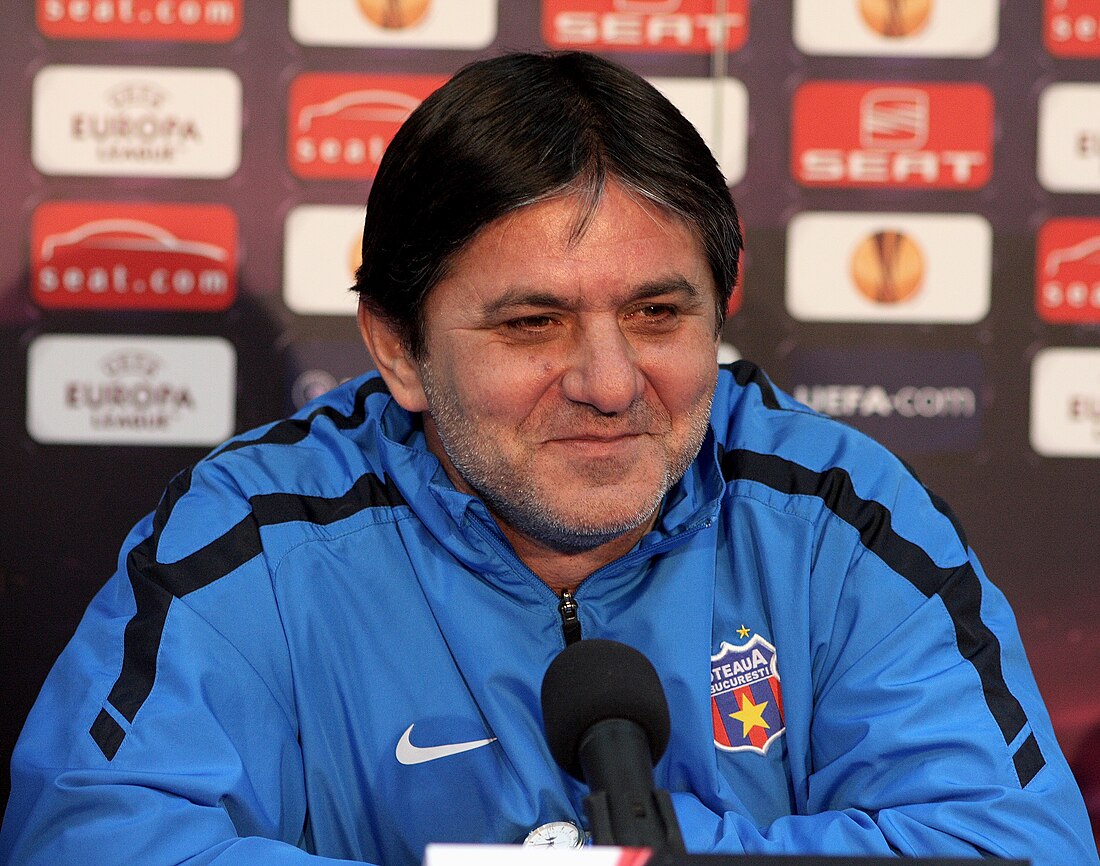Top Qs
Timeline
Chat
Perspective
Marius Lăcătuș
Romanian footballer (born 1964) From Wikipedia, the free encyclopedia
Remove ads
Marius Mihai Lăcătuș (Romanian pronunciation: [ˈmari.us miˈhaj ləkəˈtuʃ]; born 5 April 1964) is a Romanian professional football manager and former player.
Remove ads
He is the most successful footballer of Steaua București and was part of their European Cup victory in 1986. Lăcătuș is the all-time top scorer for Steaua with 16 goals in European competitions.
He played as a deep lying striker or inside forward for Steaua București most of his career, being the team's captain between 1994 and 1999. He also played for Italian side Fiorentina and Real Oviedo in Spain.
Lăcătuș is the most decorated player in the history of the Romanian First League. He has won the league a record ten times. Following him in the all time table are: Giedrius Arlauskis, Ciprian Deac, Adrian Bumbescu, Mircea Lucescu, Dumitru Stângaciu and Tudorel Stoica, all with 7 championships won.[2]
On 7 July 2021, CSA Steaua București retired his shirt number 7 at the inauguration match of the new Steaua Stadium.[3]
Remove ads
Club career
Summarize
Perspective
Lăcătuș was an iconic player for Steaua București's supporters. Even now, many years after leaving the club as a player, the supporters shout his name at home games. The supporters loved him for his spectacular way of playing football, as well as for his commitment during the games. He was nicknamed Fiara (The Beast).
He was the first player to score in the penalty shoot-out of the 1986 European Cup final against FC Barcelona, won by Steaua. After the 1990 FIFA World Cup in Italy, where he scored two goals against the USSR, Lăcătuș signed for the Italian club Fiorentina and then moved to Real Oviedo in Spain. In 1994, he returned to Steaua and played for the club until 1999, when he signed for FC Național București, where he played only half a season before retiring.
On 25 March 2008, he was decorated by the president of Romania, Traian Băsescu with Ordinul "Meritul Sportiv" — (Order of Sporting Merit) class II for his part in winning the 1986 European Cup Final.
Lăcătuș played a total of 414 games in the Romanian Divizia A (now Liga I), scoring 103 goals; 21 games in the Italian Serie A where he scored three times and also 51 games in the Spanish La Liga, scoring 7 goals. He also made 72 appearances in the European Cup, Cup Winners' Cup and the UEFA Cup, scoring 16 goals.
Remove ads
International career
Lăcătuș was capped 83 times, scoring 13 goals for the Romania national team, and played for his country in the 1990 World Cup, Euro 1996 and the 1998 World Cup.[4] In 1995, against France, he scored Romania's 800th goal.[5]
Career statistics
International
- Scores and results list Romania's goal tally first, score column indicates score after each Lăcătuș goal.
Honours
Player
Steaua București
- Divizia A (10): 1984–85, 1985–86, 1986–87, 1987–88, 1988–89, 1993–94, 1994–95, 1995–96, 1996–97, 1997–98 (record)
- Cupa României (7): 1984–85, 1986–87, 1987–88, 1988–89, 1995–96, 1996–97, 1998–99
- Supercupa României (3): 1994, 1995, 1998
- European Cup: 1985–86; runner-up: 1988–89
- European Super Cup: 1986
- Intercontinental Cup runner-up: 1986
Manager
Vaslui
- Cupa României runner-up: 2009–10
CSMS Iași
Remove ads
References
External links
Wikiwand - on
Seamless Wikipedia browsing. On steroids.
Remove ads

